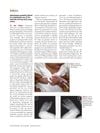 28 citations,
August 2014 in “Cancer Causes & Control”
28 citations,
August 2014 in “Cancer Causes & Control” Taking 5α-reductase inhibitors does not significantly increase the risk of breast cancer in men.
 37 citations,
April 2008 in “The Cochrane library”
37 citations,
April 2008 in “The Cochrane library” 5-alpha-reductase inhibitors can lower prostate cancer risk but may increase high-grade tumors and cause sexual side effects.
 6 citations,
February 1996 in “Clinical Pharmacology & Therapeutics”
6 citations,
February 1996 in “Clinical Pharmacology & Therapeutics” Scale created to measure hair loss in men and women; MK-386 reduces acne; Niaspan treats dyslipidemia; minoxidil increases heart rate.
 1 citations,
February 2022 in “The Journal of Urology”
1 citations,
February 2022 in “The Journal of Urology” Certain drugs like Dutasteride and Finasteride might help fight SARS-CoV-2 by increasing levels of a steroid called DHEA, which can protect the heart and increase nitric oxide to counteract the virus.
 6 citations,
March 2009 in “Annals of Saudi Medicine”
6 citations,
March 2009 in “Annals of Saudi Medicine” Finasteride use during early pregnancy may cause limb deformities in babies.
 6 citations,
March 2003 in “Archiv Der Pharmazie”
6 citations,
March 2003 in “Archiv Der Pharmazie” Scientists made new substances that can block an enzyme linked to prostate issues and hair loss, with potential for creating a new treatment.
 20 citations,
June 1995 in “Tetrahedron Letters”
20 citations,
June 1995 in “Tetrahedron Letters” New chemicals were made that can block an enzyme linked to hair loss, prostate growth, and acne.
 61 citations,
January 2018 in “Cosmetics”
61 citations,
January 2018 in “Cosmetics” Coffee silverskin may be a beneficial and safe ingredient for cosmetics, offering hydration, firmness, and potential hair growth benefits.
 August 2016 in “Journal of Investigative Dermatology”
August 2016 in “Journal of Investigative Dermatology” Dutasteride improved hair density and thickness in men not helped by finasteride, with minimal side effects.
 15 citations,
July 2016 in “Urologic Clinics of North America”
15 citations,
July 2016 in “Urologic Clinics of North America” Finasteride and dutasteride are effective for long-term treatment of enlarged prostates but have sexual side effects and a risk of high-grade prostate cancer.
 10 citations,
December 2010 in “British Journal of Dermatology”
10 citations,
December 2010 in “British Journal of Dermatology” After menopause, some women lose scalp hair and gain facial hair, with patterns suggesting different underlying causes.
 1 citations,
April 2018 in “Our Dermatology Online”
1 citations,
April 2018 in “Our Dermatology Online” Massaging the scalp with a cosmetic containing certain natural inhibitors can significantly regrow hair in men with pattern baldness.
 1 citations,
July 2022 in “Cancer Epidemiology, Biomarkers & Prevention”
1 citations,
July 2022 in “Cancer Epidemiology, Biomarkers & Prevention” 5-Alpha reductase inhibitors are safe long-term but may be outdated for preventing less significant prostate cancer.
May 2024 in “Journal of clinical medicine” Spironolactone is safe for treating female hair loss, but the safety of other drugs is uncertain.
 35 citations,
May 2020 in “Frontiers in Pharmacology”
35 citations,
May 2020 in “Frontiers in Pharmacology” Different drugs for prostate-related urinary symptoms work but have various side effects, and treatment should be tailored to the individual.
 13 citations,
June 2018 in “Current Urology Reports”
13 citations,
June 2018 in “Current Urology Reports” Hair loss drugs may cause sexual issues and infertility in men.
 67 citations,
February 1997 in “Teratology”
67 citations,
February 1997 in “Teratology” Finasteride, when given in high oral doses to pregnant monkeys, caused genital abnormalities in male fetuses, but not in female fetuses or those exposed to intravenous finasteride.
 January 2016 in “Hair transplant forum international”
January 2016 in “Hair transplant forum international” Finasteride's link to health issues like male breast cancer, infertility, and prostate cancer needs more research through placebo-controlled trials to confirm.
 December 2015 in “Vestnik dermatologii i venerologii”
December 2015 in “Vestnik dermatologii i venerologii” People with hair loss have different hormone levels, and these hormones can affect hair growth.
 April 2022 in “Medicina estética”
April 2022 in “Medicina estética” Minoxidil is the only FDA-approved treatment for female hair loss, with other potential treatments needing more research for effectiveness.
 2 citations,
June 2022 in “International Journal of Biomedicine”
2 citations,
June 2022 in “International Journal of Biomedicine” The review suggests a comprehensive approach to treat hirsutism, focusing on hair removal, medication, and managing emotional effects.
 October 2021 in “Journal of the European Academy of Dermatology and Venereology”
October 2021 in “Journal of the European Academy of Dermatology and Venereology” There have been major advances in diagnosing and treating hair loss over the last 30 years, with new drugs and improved hair transplant techniques.
 343 citations,
October 2015 in “Endocrine Practice”
343 citations,
October 2015 in “Endocrine Practice” The guide recommends specific methods for diagnosing PCOS and various treatments for its symptoms, while considering the health impacts on adolescents.

Nepenthes kampotiana extract can potentially prevent hair loss and could be an effective treatment for common baldness.
 117 citations,
March 2013 in “Journal of the European Academy of Dermatology and Venereology”
117 citations,
March 2013 in “Journal of the European Academy of Dermatology and Venereology” No effective treatment for frontal fibrosing alopecia was found, but oral 5-alpha-reductase inhibitors had the best response; for lichen planopilaris, topical corticosteroids were commonly used but had a high relapse rate.
 27 citations,
May 2017 in “Marine Drugs”
27 citations,
May 2017 in “Marine Drugs” Undariopsis peterseniana extract helps hair grow by activating certain cell growth pathways and could be a new treatment for hair loss.
 52 citations,
September 2018 in “International Journal of Molecular Sciences”
52 citations,
September 2018 in “International Journal of Molecular Sciences” Ginseng and its compounds may help hair growth and prevent hair loss, but more human trials are needed to confirm this.
 11 citations,
January 1991 in “Urology”
11 citations,
January 1991 in “Urology” New hormonal treatments for enlarged prostate show promise for safer, effective non-surgical options.
 78 citations,
January 2000 in “Gynecological Endocrinology”
78 citations,
January 2000 in “Gynecological Endocrinology” Norgestimate is the most effective birth control progestin for reducing an enzyme linked to acne and excessive hair growth in women.
 July 2024 in “Biological and Pharmaceutical Bulletin”
July 2024 in “Biological and Pharmaceutical Bulletin” Licorice extract helps hair growth and may treat hair loss.





























